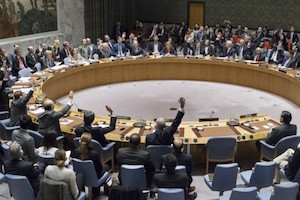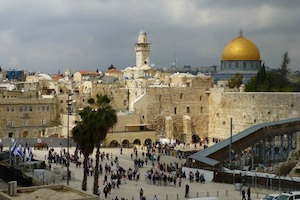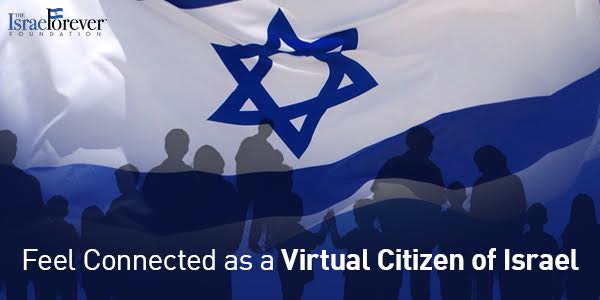Myths and Madness in the Middle East
By Aryeh Green
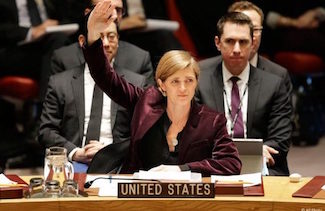
In the aftermath of UNSC Res. 2334, criticism has come from Right and Left, in America and Israel. Defenders of the decision by the U.S. to abstain, and the vote in favor by Israel’s other supposed allies in the free world, France, Britain, New Zealand, Spain and Japan, suggest it’s just another statement opposing Israel’s “settlements.” But this goes far beyond disapproval of Israel building Jewish communities in the disputed territories of Judea and Samaria (the “west bank” of the Jordan River). As many have argued, the labelling of these communities as having “no legal validity”, in spite of treaties and other instruments of international law (such as the UN Charter, UNSCR 242, and the Oslo Accords), and the inclusion of Jerusalem, has altered the political, legal and even moral framework in which efforts to resolve the conflict can proceed.
In Newsweek earlier this year, Aaron David Miller rightly suggested the new U.S. administration should reject five myths regarding their approach to Middle East issues. His analysis focuses on methods and tactics, but not on the fundamental misunderstandings which affect – or infect – decision-making. He says, correctly, that America may not be able to bring about a comprehensive end to strife in the region. And this is even more true with 2334’s promotion of the territories’ character as “Palestinian,” its denial of any Israeli claim beyond the 1949 armistice lines including the Old City of Jerusalem and the Temple Mount, and its use of legal terminology to force an anti-Israel political agenda.
A few quotes can help us to understand just how unfortunate are the current misconceptions and misrepresentations of the reality in the Middle East.
- On September 16, 2015, encouraging his people to carry out violent acts of terror against Israeli and other civilians, PA President Mahmoud Abbas said (on TV in Arabic): “We bless every drop of blood that has been spilled for Jerusalem, which is clean and pure blood, blood spilled for Allah…the Al-Aqsa [Mosque] is ours, the Church of the Holy Sepulchre is ours, and they have no right to defile them with their filthy feet.”
- On October 14th, U.S. Secretary of State John Kerry said: There has been a massive increase in settlements…and there’s an increase in the violence because there’s this frustration.”
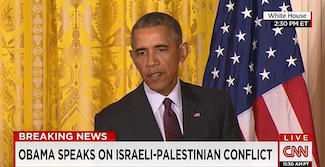
And on October 15th President Obama said: “…it’s important for both Prime Minister Netanyahu… and President Abbas… to try to tamp down rhetoric that may feed violence…”
There are three essential myths regarding the conflict in the Middle East, and it is belief in these myths which underlies the failure of so many attempts to achieve peace. It is madness when a leader who calls for his people to shed their blood and the blood of innocent civilians is called a moderate. It is madness when leaders of the free world cite frustration as an understandable reason for murder. And it is madness to ignore the Arabs’ responsibility for the perpetuation of the conflict and to hold Israel primarily answerable for the lack of peace in the region—given that precisely such attitudes and policies clearly lead to more of the same. Wasn’t it Einstein who said that trying the same thing over and over while expecting different results is a definition of insanity?
Understanding these myths is crucial for any chance of real reconciliation in our region. Reasonable people can – and do – debate Israel’s policies on virtually all issues. Yet to be effective, to be relevant, all our arguments must be based on facts, not illusions. Only policy discussion founded in reality has any potential for success in our efforts to achieve real peace.
The three fundamental myths of the Arab-Israeli conflict are:
- Myth #1 – Abbas and other “Palestinian” leaders are “moderate” & want peace.
- Myth #2 – The primary obstacle to peace in the Middle East is the “settlements”
- Myth #3 – This is a “Palestinian-Israeli conflict,” a territorial (or national) dispute.
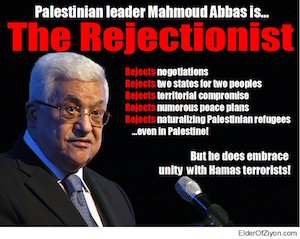
Documented history refutes these myths with compelling arguments, categorically. Policy-makers, educators, activists and religious leaders who acknowledge the truths which negate these myths are more likely to successfully encourage moves towards peace in the region. Nothing in this line of reasoning absolves Israel of its obligation to act lawfully and morally—and wisely and strategically—in its pursuit of security and peace, nor ignores Israel’s policy failings and mistakes; nor does this lead inexorably to any policy prescriptions. However, the historical record and accepted (western) legal norms should clarify where the brunt of responsibility lies for the prolongation of this violent regional and international war for over a hundred years.
Myth 1: “Palestinian Authority President Mahmoud Abbas and other Palestinian Arab leaders are ‘moderate’ & want peace.”
The statements above, and the many other celebrations of the murder of innocents and calls for violence, put paid to this myth of moderation swiftly. Moreover, Abbas’ and other leaders have consistently been “immoderate” in their refusal to compromise and even negotiate, and in their rejection of the legitimacy of Jewish national identity and therefore of Israel’s founding, let alone any Jewish connection to the land. Moderates, according to the definition of the word, believe in and pursue compromise, tolerance, coexistence, acceptance and peace. Palestinian Arabs[i] are inculcated from childhood into a culture of hatred full of vitriol which glorifies terrorist murders of innocents as heroic “martyrs” and icons of their national identity, through their education system and media, political and cultural and religious leaders. They are taught in school and TV/radio talk shows that Jews are usurpers of their land, descendants of pigs and apes, murderers and cheaters, and that the Jews and Americans, Christians and the West, are decadent enemies of the Arab Umma (people).
In their pronouncements, cultural and educational policies, politics and actions, Mahmoud Abbas and the other heads of the PLO/PA foment intolerance and hostility. Moderate, the facts prove, these leaders are not. Abbas and the Kings of Saudi Arabia or Jordan and others are (usually) “less extreme” than their fanatical murderous co-religionists in Hamas, ISIS or Iran. But if “moderate” is to have any meaning, it cannot be used to refer to these leaders and regimes. Regularly imprisoning journalists or citizens for posting criticism of the government on Facebook; beating or otherwise punishing women for improper (sic) behavior; outlawing the practice of religions other than Islam; allowing or even encouraging the “honor killing” (sic) of young women, clitorectomies, slavery and hatred of Christians, Jews, America and Israel, are not actions practiced by moderates. Most of this list, except for slavery, is true of Israel’s “moderate” peace partners in Fatah, the PLO and the Palestinian Authority. Miller’s call, that of Natan Sharansky over a decade ago, for Arab leaders willing to reform their societies is right on target: and it starts with those supposedly “moderate” becoming truly interested in freedom, tolerance, coexistence and peace.
Myth 2: “The primary obstacle to peace in the Middle East is the ‘settlements.’”
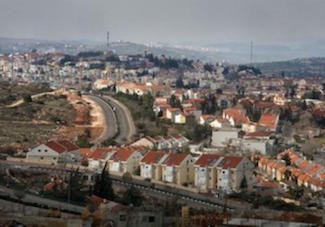
Ariel. View of settlement
Two historical facts put paid to this absurd contention—whether one supports or opposes Israel’s building of communities and homes in the disputed territories of Judea and Samaria (the historical and accepted cartographical term for that area, now known also as the ‘West Bank’ of the Jordan River). First, there were of course no “settlements” in those territories in the years they were illegally occupied by Jordan, from Israel’s (re-) establishment in 1948 until Israel took them over following its defensive war in 1967. Yet there was no peace.
Then, when Israel dismantled 21 Jewish communities in the Gaza Strip (and four in northern Samaria), expelling some 11,000 Jewish residents, and there were no more “settlements” in Gaza… there was no peace. Instead, there were rockets, thousands of them, crashing down on Israel’s southern and then central cities. The settlements, clearly, were and are not the primary obstacle to peace—since if they were, peace would have reigned before the first were established in the early 1970’s, and/or after the Gaza community was demolished in 2005.
But these two historical references are really only the beginning in dispelling this second myth. We can dismiss easily the absurd notion, referenced in the quote from John Kerry above, that there has been an “increase in settlements”—let alone a “massive” such buildup. The facts (and they are, indeed facts, any school child can check them online) are that there have been no new settlements—none—for well over a decade. What ‘expansion’ has occurred has involved building new housing inside the boundaries of existing communities (“settlements”). So much for a “massive increase in settlements” as Kerry termed it (or the “millions” of settlements described by Deputy National Security Ben Rhodes as he tried to justify the betrayal of Israel in Resolution 2334). This part of the myth is particularly outrageous as it is so patently false, and as it seems to offer the Palestinians an excuse for their ongoing fabricated grievance—and for their continual resort to violence. As if “frustration” is ever an excuse for violence, on the personal or national level.
An additional historical reference point repudiating the myth of the “settlements” as the primary obstacle to peace between the Palestinian/Arab world, on the one hand, and Jews and Israel on the other, is the significant number of peace proposals and offers made in negotiations by Israel. Every one of Israel’s conciliatory gestures was simply rejected by the Palestinian or other Arab leadership. There have been at least six offers of statehood explicitly made by Israel, disregarded or spurned each time anew, on whatever subtext was handy at the time. Palestinian refusal to even discuss the topic in negotiations demonstrates that those nefarious “settlements” are not the crux of the problem. Of course this is directly related to the myth of these leaders’ “moderation.”
Finally, a theoretical proof suggests itself, compelling in its logic if far too often not even considered, in a form of western discrimination towards supposedly primitive Arab society. (The free world doesn’t expect Muslim or Arab or Palestinian culture to afford opportunity for real coexistence, an inexcusably racist stance on the face of it.) If we imagine for a moment, just for intellectual curiosity, how a truly moderate leader of the Arab world or Palestinians might view real peace between Arab and Jew in the region, we can quickly agree that Jewish communities in Judea and Samaria actually pose no obstacle to the sort of reconciliation and long-term neighborly relations inherent in our concept of “peace.” A small percentage of Jews living among Arabs in a nascent “State of Palestine” would clearly not be an impediment to peace or progress. Quite the opposite.
France and Germany, after some 800 years of conflict and warfare, finally realized it would be of greater benefit to their people to live in peace; the concept that traditional enemies might put aside their enmity is hardly a new one. Peace between one-time adversaries is certainly possible, even to the extent of citizens of one nationality residing in the other country.
More locally, and much more relevantly, Israel itself is the best example of the power of this point. Fully 20% of Israel’s population are minorities—predominantly Arabs, and mostly Muslim. These Arab Muslims live as full members of Israeli society, with full access to services and education, jobs and recreation, and with no fear for their lives or property.[ii]
Real peace between Israel and its Arab neighbors would by definition allow for some minority of Jews, and/or Christians or others, to similarly live within Palestinian society. For argument’s sake, let’s say not more than 5% of the population of any “State of Palestine” to be established, in whatever borders, could be Jews or other minorities. “Poof”—to borrow another asinine quote of Kerry’s—the “settlements” are no longer any sort of obstacle to peace. If Brits can live all their lives in the south of Spain, but remain loyal and patriotic British subjects; if Americans can live in Canada, for business or personal reasons (or historical or national reasons, for that matter), then Jews can live in Hebron for spiritual or national or historical reasons, as citizens of “Palestine,” if real peace were to be desired by the Arab leaders of such a state. Or they could live in that Palestinian state as Israeli ex-pats, should they prefer.
Myth 3: “This is a “Palestinian-Israeli conflict”, a territorial or national struggle; agreeing on borders and the establishment of a ‘Palestinian’ state will resolve it.”
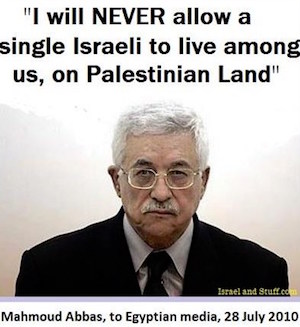
This third myth misconstrues Arab and Palestinian attitudes towards Jews and Israel, their refusal to negotiate, and their general extremism. As has been noted by many experts, including truly moderate Arabs and Palestinians, this is not chiefly a territorial or even a national battle between two rival communities vying for the same land. It is, sadly and tragically, a religious, ideological, civilizational struggle.
Were that it were just a territorial or even national conflict. My friends Mohammed Dajani and Walid Salem, among others, and I have often agreed we could resolve the Arab-Israeli conflict relatively easily if the only issue on the table was where to draw the borders. But as described by the world’s leading scholars of Arab and Muslim history and society, like Bernard Lewis or Fred Maroun, this is nothing less than a clash of civilizations. It is—as stated explicitly by the Arab leadership repeatedly—a religious/ideological struggle. The Arab and Muslim world and the Palestinian leadership declare again and again their violent hostility towards Jews (and Christians, and the West), their unabated opposition to any expression of Jewish national identity, and their rejection of any connection between the Jews and their land, not least the establishment of a national home for the Jews, the nation-state of the Jewish people, Israel. So it has been for over the past hundred years or more. And so it is today.
Lucy Aharish, an Arab-Israeli anchor on Israel Television, made a passionate statement along these lines recently. Also recently, a supposedly moderate Arab-Israeli student said in a class at an Israeli college, to his Jewish peers, “this is our land; you’ll be gone eventually,” as reported by Professor Daniel Gordis. This is no “right-wing” conspiracy theory; Israeli leaders of the Left including Professor Shlomo Avineri and Labor Party head Isaac Herzog have explicitly said similar things.
More convincingly, Arab/Muslim/Palestinian leaders echo these themes every time they or their preachers or teachers or media outlets and educational materials constantly repeat the canards of the Jews and Israelis as imperialist or colonialist, racist or apartheid, oppressive or militarist or Nazi-like usurpers. When Yasser Arafat then, or the head of the Waqf (the Jordanian-appointed body administering the Temple Mount area in Jerusalem) now, declares that there was no Jewish Temple there, and call for Muslim and Arab rioting to protest some sort of Israeli attempt to “Judaize” [sic] the only site on earth holy to Jews, we begin to understand the significance of this third myth. And we may appreciate the gravity of the depth of ignorance on the part of those members of today’s UN Security Council who, unwittingly perhaps, have fed this beast of denial and rejection by statement that Jerusalem is somehow not connected to the Jewish people—as UNESCO did recently as well.
There is a fierce and deep opposition by most Arab and Muslim leaders to any expression of Jewish sovereignty in the Land of Israel. The denial of even any Jewish connection to the area is part and parcel of the cultural milieu permeating Palestinian, Arab and Muslim societies across the region and the world, leading to the indoctrination of vicious anti-Israel and anti-Jewish attitudes reflected in Pew and other surveys every year. The settlement shibboleth appears to be a smokescreen to hide the basic bigotry and loathing voiced continually (in Arabic) towards the Jews, Israel, Christians and the West in general—the infidels. When Palestinian Arab leaders refer to the “Occupation of ‘48” and to towns like Haifa, Tiberius, Yafo, Acre and Lod as “Palestinian,”, the rejection of the Jewish people’s and Israel’s connection to the land and very legitimacy is revealed in all its simplicity and crudity. And President Obama’s suggestion, in the quote above and of course in Resolution 2334, that there is some equivalence to this hateful rhetoric and actions by Palestinians/Arabs on the Jewish and Israeli side is absurd, and destructive.
As the indigenous people of the region, the return of Jews to Judea makes not only linguistic and religious but historical and national and political and moral sense. As it did to the international community some hundred years ago, when they gave expression to their understanding of the re-emergence of Jewish national identity in the mandate given to Great Britain by the League of Nations to facilitate the (re-) “establishment of a national home for the Jewish people in Palestine” after wresting it in WWI from the oppressive Ottoman Turkish occupation of the land.
Conclusion
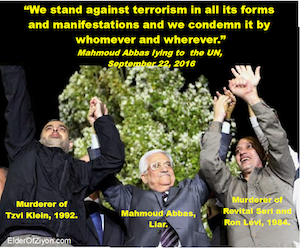
All three of the myths are encapsulated in Mahmoud Abbas’ calling, at the podium of the United Nations on September 22, 2016, for Great Britain to “apologize” for issuing the government policy supporting the validity of the Jews’ connection to their ancestral homeland known as the Balfour declaration, incorporated into that Mandate. The same United Nations which inherited the Mandate(s) and which explicitly, at its founding, insisted that the regimes, rights and privileges of those arrangements continued to be in force as a matter of binding international treaty law, hosted this immoderate leader calling by implication for the dismantling of a UN member state. This is proof that his and their opposition to Israel has nothing to do with the Jewish communities in Judea and Samaria, and that they are waging an ideological, civilizational struggle to deny the Jews the very self-determination they demand for themselves.
And the UNSC Resolution 2334 last week supports and promotes that struggle, by ignoring or contravening the provisions of the Mandate; of the UN Charter; of the recognition of Israel and the terms of its armistice agreements of 1949 with Jordan, Lebanon, Egypt, Syria and Iraq; of the Road Map; of the Oslo Accords; and of any objective understandings of history and law, let alone politics and morality.
Nothing of the foregoing suggests that Israel has not made mistakes, in action or in policy, or that Israel cannot do more to address legitimate complaints of Arabs in the territories or among Israeli citizenry. And none of the above necessarily leads to a compulsory conclusion or policy prescription. One can advocate the withdrawal by Israel from Judea & Samaria, and the establishment of a Palestinian state there, or champion the annexation of those territories by Israel; in both cases dismissal of these myths and acknowledgement of the truth which disproves them is necessary to establish a firm foundation for any policy prescription. When one rejects these fundamental myths and confronts reality, many additional possibilities suggest themselves, from confederation to regional arrangements and/or territorial swaps to Palestine east of the Jordan River.
Successful resolution our Arab-Israel conflict—which is to say, the Arab war against the Jewish people and nation-state—requires two things. First, the Arab and Muslim leadership must lead their societies to an acceptance of the legitimacy of the founding and existence of the nation-state of the Jewish people, Israel. And second, the leadership of the free world—starting with American leaders—must reject these myths of Palestinian “moderation”, the notion that “settlements” are the main cause of our conflict, and the idea that it is of a “territorial” nature.
It’s that simple: real moderation, tolerance and co-existence on the part of the Arabs, along with an accurate Western understanding of the historical, legal, political and social factors perpetuating the situation, would make all the difference. How much longer will we have to wait?
[i] There is a legitimate historical perspective which notes that a “Palestinian” prior to 1949 was a Jew residing in Eretz Yisrael, or “Palestine” – hence the Palestine Post, Palestine Symphony Orchestra, Anglo Palestine Co. and the Palestine Regiment in the British army, all were Jewish, and known to be so. A unique Arab identity emerged slowly over the mid-20th-Century, and then explosively following Israel’s establishment. Even the creation of the “Palestine Liberation Organization” was more part of the Pan-Arab effort to destroy Israel than an expression of separate Arab identity in 1964. Yet in spite of not having a distinct language, culture, religion, cuisine, genetic makeup or historical connection to a specific land beyond the past few generations, the “Palestinians” have now established themselves as a discrete community within the wider Arab Middle East, accepted by the world, including the vast majority of Israelis. There is no point in denying the Palestinians’ identity; recognizing the relatively recent nature of the emergence of this communal character is important to understanding the nature of the conflict, though in no way rejects its validity.
[ii] Discrimination is an issue—as it is in Germany against Turks, in Britain against Asians, in France against Algerians, and in the US against blacks and Latinos. Israel is facing its challenges of relating to its minorities—some of whom, unlike these other examples, express violent hostility to the state—with education and public programs, as if not more assertively than other western nations facing similar issues. None of this detracts from the point being made.
Aryeh Green is VP Strategic Investment at Gigawatt Global / EnergiyaGlobal, a leading solar energy developer for Africa, and Director Ex Officio of MediaCentral, a Jerusalem-based project of HonestReporting providing services to the foreign press in Israel, and has an extensive background in the public and private sectors, having served as a senior advisor to minister Natan Sharansky in the Israeli Prime Minister's office.

